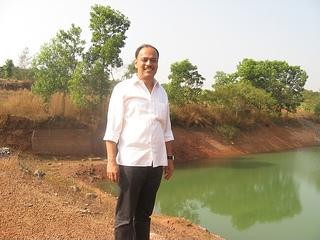/topics/wastewater
Wastewater
How to make your home self sufficient- An open house workshop, The Alternative, Bangalore
Posted on 13 Jun, 2013 03:33 PMOrganisers
The Alternative in collaboration with Apartment ADDA
Venue
The Energy and Resources Institute (TERI), Domlur II Stage, Bangalore
About the workshop

Delhi’s ground water hits rock bottom
Posted on 20 May, 2013 12:40 PMGreen pastures and meadows, tall trees, lakes, wells and the river…those are my memories of Delhi. It wasn’t too long ago that one woke up early to the sounds of lawns being watered, children running off to school and people walking in the parks. A flurry of activity but quite different from what it is today.

Job opportunities with Consortium for DEWATS Dissemination (CDD) Society
Posted on 27 Apr, 2013 10:43 AMSweet smell of success: Human waste fertilises land & turns farmers wealthy in Bangalore
Posted on 17 Mar, 2013 05:07 PMHuman excreta is loaded with nutrients, which when disposed off discriminately, increases pollution and leads to a loss of resources. On an average a human being produces some 500 litres of urine and 50 kilograms of faeces a year, sufficient to fertilise plants that would produce more than 200 kilograms of cereals!
Experiences from a civil society initiative to restore stretches of toxic Yamuna: Report of a conference organised by PEACE, Thames River Restoration Trust and WWF India at New Delhi in March 2013
Posted on 16 Mar, 2013 09:12 PMDr Peter Spillet of the Thames River Restoration Trust shared that the Trust was the recipient of the 2010 Theiss International Riverprize funds on behalf of many organizations involved in the restoration work on river Thames in United Kingdom. He said that the Trust had shared the money for twinning projects in various countries including in India.
Training programme on Decentralised Wastewater Treatment Systems (DEWATS), CDD Society, Bangalore, May 27-31, 2013
Posted on 13 Mar, 2013 10:46 AMConference report: The Anil Agarwal Dialogue on "Excreta does matter", organised by Centre for Science and Environment on 4-5 March 2013 at New Delhi
Posted on 12 Mar, 2013 03:23 PMA close examination of these two issues shows that the water and sewage challenge is already grave and could get worse. With this as the backdrop, Centre for Science and Environment (CSE), a public interest research and advocacy organisation based in New Delhi, organised a two day conference called the Anil Agarwal Dialogue on “Excreta does matter”. The conference took place at the Jacaranda Hall, India Habitat Centre, Lodhi Road, New Delhi on 4 and 5 March 2013.
The dialogue aimed at furthering the agenda of CSE’s seventh State of India’s Environment report titled Excreta Matters. This report is a comprehensive survey of the situation of water and wastewater management in 71 Indian cities. The study found that most cities lack a basic policy direction on how best to tackle issues of demand, supply and treatment of water, and of management of sewage.
The Dialogue being the first of its kind brought together a wide range of professionals, activists, practitioners, policy makers, academicians, researchers and administrators from the water sector. The event was aimed at drawing attention on the critical issues of how cities will get affordable and sustainable water and waste systems that can supply to all and take back and treat the sewage of all.

Bangalore garbage finds dumping place in Mandur: Civic body promises better infrastructure projects in exchange - Roundup of the week’s news (March 4- March 10, 2013)
Posted on 11 Mar, 2013 11:42 PMBangalore garbage finds dumping place in Mandur: Civic body promises better infrastructure projects for communities living there
Reviving a lake transforms 120 acres of barren land into a self-sufficient organic farm: The story of Rajesh Naik and Oddoor farms, Mangalore, Karnataka
Posted on 05 Mar, 2013 03:39 PMA visit to Oddoor farms near Mangalore, Karnataka, provides an inspiring example of the efforts made by Rajesh Naik ji to transform 120 acres of barren land into a lush green farm through his persistent efforts of creating a two acre and fifty feet deep lake, which has not only transformed the surrounding area, but has also helped in improving the water table in the surrounding village, besides helping in the development of a self sufficient organic farm and a dairy.
Oddoor farms, around 25 kilometres away from Mangalore city is a great example of a very successful effort made by Rajesh Naik ji who has transformed 120 acres of barren land into a self sufficient organic farm by developing a 50 feet lake on two acres of land. The journey has been a long one and not without its share of challenges, but persistence and constant optimism and hard work to overcome challenges has reaped results in the last twenty years, informs Rajesh Naik ji.

Rajesh Naik ji near the lake he has developed at the Oddoor farms near Mangalore





